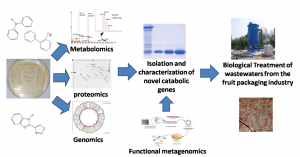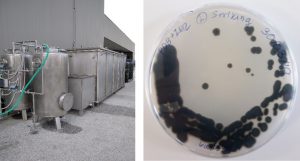Postharvest treatment of fruits involves drenching or spraying with fungicides like thiabendazole, imazalil, ortho-phenylphenol, fludioxonil, iprodione and preservatives like diphenylamine (withdrawn). The wastewaters produced contain high pesticide loads and their direct disposal into soil disposal sites or in the municipal wastewater treatment plants are known to have detrimental effects on environmental quality. All these pesticides were given authorization for use at the EU level under the clause that "an efficient treatment of the produced wastewaters should be operative at a local scale". To date there is no sustainable and efficient means of treating these wastewaters and the development and implementation of such methods is urgently needed. Our group focuses on the microbial degradation of the chemicals contained in those effluents with a long-term goal to develop microbial inocula for use in biological treatment units. In this frame we have isolated bacteria that could degrade all the major fungicides used by the fruit-packaging industry like thiabendazole, ortho-phenylphenol, diphenylamine, iprodione and recently, in collaboration with the Democritus University of Thrace (DUTH, Dr Ntougias group), fludioxonil. In addition, our group recently isolated a Mycosphaerella tassiana strain that is able to degrade imazalil covering the full range of fungicides contained in agroindustrial effluents. Before application, the genetic mechanisms associated with the transformation of these pesticides are elucidated through multi-omic approaches including genomics, transcriptomics and proteomics. Novel enzymes i.e. a novel FAD-dependent monoxygenase involved in the transformation of ortho-phenylphenol, are isolated and characterized through heterologous expression.

Our pipeline for the development and implementation of microbial inocula for application in the treatment of agro-industrial effluent.
The group in collaboration with DUTH and the fruit-packaging industry POULIS S.A. in Thessaly has setup and implemented a full-scale bioreactor system which is currently operative and evaluated for the treatment of the effluents of the fruit-packaging plant using our microbial inocula.

A full-scale bioreactor implemented in a fruit-packaging plant for the treatment of agro-industrial effluents. The reactor is inoculated with fungal and bacterial strains specialized in degrading and detoxifying the fungicides contained in those effluents.
We are currently working on the isolation of the key catabolic enzymes from the microbial metabolic pathways of compounds like iprodione using comparative genomics (i.e. iprodione-degrading bacteria) and thiabendazole using (meta)-omic approaches
Funding
 MSCA-IF-H2020, Exploring microbial networking in pesticides biodegradation: novel inocula and biocatalysts for biodepuration of agro-industrial effluents (EMIGRATE). Funding: European Commission, 160000 €. Duration: 2017– 2019, Benefited Fellow: Dr. S. Vasileiadis, Coordinator: Dimitrios Karpouzas
MSCA-IF-H2020, Exploring microbial networking in pesticides biodegradation: novel inocula and biocatalysts for biodepuration of agro-industrial effluents (EMIGRATE). Funding: European Commission, 160000 €. Duration: 2017– 2019, Benefited Fellow: Dr. S. Vasileiadis, Coordinator: Dimitrios Karpouzas
![]() RESEARCH-CREATE-INNOVATE call, Title: Development and implementation of novel biobased methods for the treatment of pesticide-contaminated wastewaters from agro-industries (MINOTAUR). Funding Body: EYDE-ETAK. Funding: 300,000 €, Duration 2018-2021. Coordinator UTH: Dimitrios Karpouzas
RESEARCH-CREATE-INNOVATE call, Title: Development and implementation of novel biobased methods for the treatment of pesticide-contaminated wastewaters from agro-industries (MINOTAUR). Funding Body: EYDE-ETAK. Funding: 300,000 €, Duration 2018-2021. Coordinator UTH: Dimitrios Karpouzas
 IKY-DAAD project: Do we isolate via in vitro enrichment cultures the right pesticide-degrading bacteria? Mechanisms involved and web-food C transfer. Funding: State Scholarship Foundation of Greece - DAAD, Collaborating Institute: UFZ-Leipzig (Dr A. Chatzinotas), Duration: 2014-2015. Coordinator Dimitrios Karpouzas
IKY-DAAD project: Do we isolate via in vitro enrichment cultures the right pesticide-degrading bacteria? Mechanisms involved and web-food C transfer. Funding: State Scholarship Foundation of Greece - DAAD, Collaborating Institute: UFZ-Leipzig (Dr A. Chatzinotas), Duration: 2014-2015. Coordinator Dimitrios Karpouzas
 State Scholarship Foundation of Greece, Call Siemens Postdoctoral Fellowships, Evaluation of biobeds for the biological detoxification of pesticides contained in agro-industrial effluents. Funding body: State Scholarship Foundation of Greece, Funding 18000 €, Duration 2017, Coordinator Dimitrios Karpouzas, benefited fellow: Dr P. Karas
State Scholarship Foundation of Greece, Call Siemens Postdoctoral Fellowships, Evaluation of biobeds for the biological detoxification of pesticides contained in agro-industrial effluents. Funding body: State Scholarship Foundation of Greece, Funding 18000 €, Duration 2017, Coordinator Dimitrios Karpouzas, benefited fellow: Dr P. Karas
 State Scholarship Foundation of Greece, Call PhD students fellowships, Study of the efficiency and microbiology of biobed systems which receive wastewaters from diverse processing agro-food industries. Funding Body: State Scholarship Foundation of Greece, Duration: 2018-2021, Coordinator Dimitrios Karpouzas, Benefited Student: Christina Papazlatani
State Scholarship Foundation of Greece, Call PhD students fellowships, Study of the efficiency and microbiology of biobed systems which receive wastewaters from diverse processing agro-food industries. Funding Body: State Scholarship Foundation of Greece, Duration: 2018-2021, Coordinator Dimitrios Karpouzas, Benefited Student: Christina Papazlatani
 EXCELLENCE ΙΙ, The microbial detoxification of pesticides from the fruit-packaging industry: using omics in bioremediation (BIOREMEDIAT-OMICS). Funding: General Secretariat of Research and Technology, Greece. Duration: 2014-2015, Coordinator: Dimitrios Karpouzas
EXCELLENCE ΙΙ, The microbial detoxification of pesticides from the fruit-packaging industry: using omics in bioremediation (BIOREMEDIAT-OMICS). Funding: General Secretariat of Research and Technology, Greece. Duration: 2014-2015, Coordinator: Dimitrios Karpouzas
Publications
- Campos M., Perruchon C., Vasileiadis S., Menkissoglu-Spiroudi U., Karpouzas D.G., Diez M.C., (2015) Isolation and characterization of bacteria from acidic pristine soil environment able to transform iprodione and 3,5-dichloroaniline. International Biodeterioration and Biodegradation104: 201-211
- Perruchon C., Batianis C., Zouborlis, S., Papadopoulou E.S., Ntougias S., Vasileiadis S., Karpouzas D.G., (2015) Isolation of a diphenylamine-degrading bacterium and characterization of its degradation capacities, bioremediation and bioaugmentation potential. Environmental Science and Pollution Research 22: 19485-19496
- Perruchon C., Patsioura V., Vasileiadis S., Karpouzas D.G, (2016) Isolation and characterization of a Sphingomonas strain able to degrade the fungicide ortho-phenylphenol. Pest Management Science 72(1): 113-124
- Campos M., Karas P., Perruchon C., Papadopoulou E.S., Christou V., Menkissoglou-Spiroudi U., Diez M.C., Karpouzas D.G., (2017) Novel insights into the metabolic pathway of iprodione by soil bacteria. Environmental Science and Pollution Research 24:152-163
- Campos M., Perruchon C., Karas P.A.., Karavasilis D., Diez M.C., Karpouzas D.G., (2017) Biodegradation and rhizosphere-assisted bioaugmentation as strategies for optimization of the dissipation capacity of biobeds. Journal of Environmental Management 187(1): 103-110
- Perruchon C., Chatzinotas A., Omirou M., Vasileiadis S., Menkissoglu-Spiroudi U., Karpouzas D.G., (2017) Isolation of a bacterial consortium able to degrade the fungicide thiabendazole: the key role of a Sphingomonas phylotype. Applied Microbiology and Biotechnology 101:3881-3893
- Perruchon, C., Vasileiadis S., Rousidou C., Papadopoulou E.S., Tanou G., Samiotaki M., Garagounis C., Molassiotis A., Papadopoulou K.K., Karpouzas D.G., (2017) Metabolic pathway and cell adaptation mechanisms revealed through genomic, proteomic and transcription analysis of a Sphingomonas haloaromaticamans strain degrading ortho-phenylphenol. Scientific Reports 7: Article 6449, doi:10.1038/s41598-017-06727-6
- Perruchon C., Pantoleon A., Veroutis D., Gallego-Blanco S., Martin-Laurent F., Liadaki K., Karpouzas D.G., (2017) Characterization of the biodegradation, bioremediation and detoxification capacity of a bacterial consortium able to degrade the fungicide thiabendazole. Biodegradation 28(5-6): 383-394
- Papadopoulou E.S., Genitsaris S., Omirou M., Perruchon C., Stamatopoulou A., Ioannides I., Karpouzas D.G., (2018) Bioaugmentation of thiabendazole-contaminated soils from a wastewater disposal site: Factors driving the efficacy of this strategy and the diversity of the indigenous soil bacterial community. Environmental Pollution 233: 16-25
- Papadopoulou E.S, Perruchon C., Vasileiadis S., Rousidou K., Tanou G., Samiotaki M., Molassiotis A., Karpouzas D.G., (2018) Metabolic and evolutionary insights in the transformation of diphenylamine by a Pseudomonas putida strain unravelled by genomic, proteomic and transcription analysis. Frontiers in Microbiology 9: 676, doi: 10.3389/fmicb.2018.00676
- Navrozidou E., Remmas N., Melidis P., Karpouzas D.G., Tsiamis G., Ntougias S., (2019) Biodegradation potential and diversity of diclofenac-degrading microbiota in an immobilized cell biofilter. Processes 7(9), 554; https://doi.org/10.3390/pr7090554
- Perruchon C., Vasileiadis S., Papadopoulou ES., Karpouzas D.G., (2020) Genome-based metabolic reconstruction unravels the key role of B12 in methionine auxotrophy of an ortho-phenylphenol-degrading Sphingomonas haloaromaticamans. Frontiers in Microbiology 10 January 2020 | https://doi.org/10.3389/fmicb.2019.03009
- Mavriou Z., Alexandropoulou I., Melidis P., Karpouzas D.G., Ntougias S. (2020) Biotreatment and bacterial succession in an upflow immobilized cell bioreactor fed with fludioxonil wastewater. Environmental Science and Pollution Research https://doi.org/10.1007/s11356-020-09231-z
- Vasileiadis S., Perruchon C., Sheer B., Adrian L., Steinbach N., Trevisan M., Aguera A., Chatzinotas A., Karpouzas D.G., (2021) Nutritional inter-dependencies and a carbazole-dioxygenase are key elements of a bacterial consortium relying on a Sphingomonas for the degradation of the fungicide thiabendazole. BioRxiv doi: https://doi.org/10.1101/2020.03.30.015693
- Azis K., Mavriou Z., Karpouzas D.G., Ntougias S., Melidis P., (2021) Evaluation of sand filtration and activated carbon adsorption for the post-treatment of a biologically-treated fungicide-containing wastewater. Processes submitted
Personnel
Dr Chiara Perruchon, Postdoc fellow
Dr Panagiotis Karas, Postdoc fellow
Christina Papazlatani, PhD student